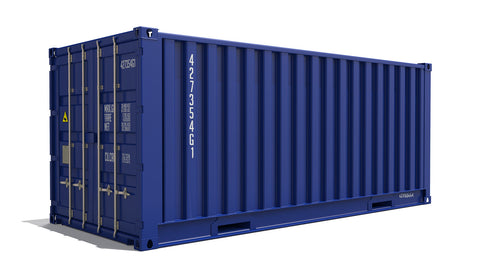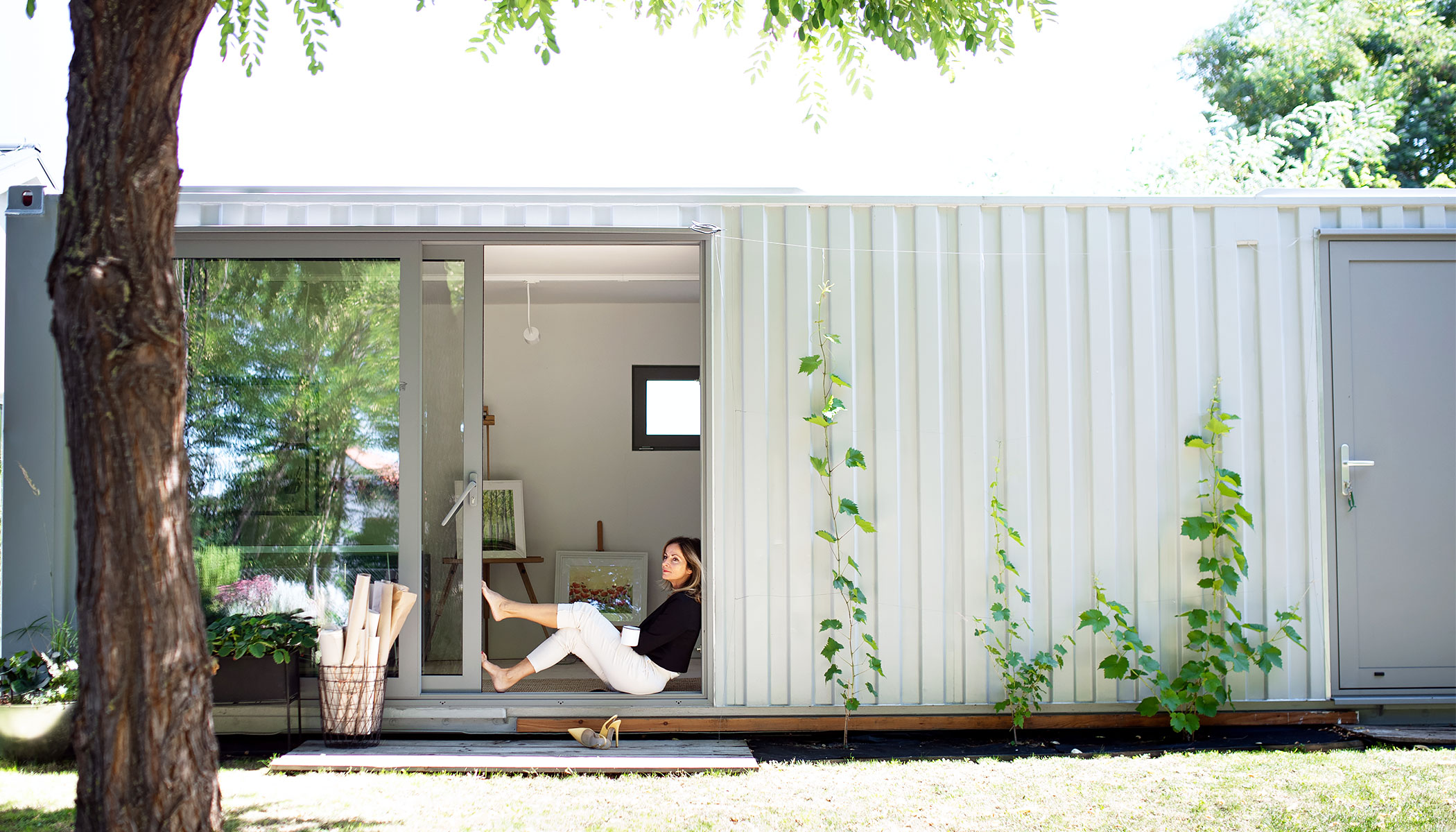Whatever You Need to Understand About Shipping Containers and Their Practical Applications
Shipping containers have advanced from mere tools for transportation to functional structures with countless practical applications. Their durable layout and typical sizing make them optimal for a variety of uses past delivery. From innovative housing remedies to lasting farming, their versatility is notable. Yet, the opportunities do not end there. Exploring their different features reveals shocking insights into modern-day difficulties and innovative remedies. What various other duties could these containers play in today's world?
The Layout and Structure of Shipping Containers

Internally, containers are developed to make the most of area, frequently including wood or steel flooring that can sustain substantial weight. Ventilation systems might be integrated to avoid moisture buildup, which is critical for delicate freight. In addition, reinforced edges permit very easy handling by cranes and forklifts, helping with smooth loading and dumping. This thoughtful style and structure add to the containers' adaptability throughout various shipping and storage applications.
Benefits of Using Shipping Containers
While many transportation approaches have their advantages, making use of shipping containers sticks out as a result of their unrivaled versatility and effectiveness. Shipping containers use a standard dimension, making them easy to pile and carry across numerous modes of transport, consisting of trains, trucks, and ships. This standardization lowers filling and dumping times, thus raising general efficiency.
In addition, shipping containers are created from long lasting materials, giving durable defense for products during transit. They are secure and weather-resistant, lessening the threat of damage from ecological factors or theft. Additionally, the modular layout of delivery containers permits very easy modification, enabling businesses to adapt them for numerous objectives, such as storage space or mobile workplaces.
Their transportability and cost-effectiveness make delivery containers an appealing choice for businesses looking to streamline logistics and supply chain operations. These benefits add to the growing appeal of delivery containers in different industries.
Innovative Real Estate Solutions With Shipping Containers
Ingenious real estate solutions have arised as an amazing application of delivery containers, leveraging their fundamental staminas for property use. These flexible structures supply a lasting option to traditional building products, frequently at a portion of the cost. Engineers and designers have actually transformed containers right into stylish, practical homes, providing to diverse way of lives and choices.

Shipping containers are ecologically friendly, promoting recycling and reducing waste. Many jobs concentrate on energy performance, integrating photovoltaic panels and environment-friendly roof coverings. As urbanization rises, these cutting-edge housing solutions offer a practical response to real estate lacks while cultivating an unique architectural visual.
Shipping Containers in Retail and Pop-Up Shops
A growing number of stores are turning to delivering containers as a dynamic remedy for retail areas and pop-up shops. These flexible structures use a cost-effective option to standard store fronts, allowing organizations to produce special, eye-catching settings that draw in customers. Their modular design makes it possible for very easy transportation and installment, making them perfect for seasonal or short-lived retail areas.
Sellers can tailor shipping containers to show their brand name identity, transforming them right into visually appealing shops that stand out in crowded marketplaces. The compact nature of containers likewise encourages reliable use of space, permitting imaginative layouts that enhance consumer circulation and interaction. In addition, delivering containers can be situated in unusual places, such as city parks or uninhabited great deals, increasing accessibility and foot traffic.
As the retail landscape evolves, delivering containers provide a flexible and innovative option that satisfies the demands of contemporary customers while improving the shopping experience.
Sustainable Farming Practices Utilizing Shipping Containers
Lasting farming practices progressively incorporate shipping containers as ingenious remedies for farming - Shipping Containers for Sale. These container farms utilize hydroponics to make best use of area and source performance, using an economical strategy to food manufacturing. By transforming shipping containers right into agricultural centers, farmers can address food safety and environmental worries concurrently
Container Farming Advantages
While standard farming faces obstacles such as land scarcity and climate adjustment, container farming presents a feasible option that makes the most of room and sources. This cutting-edge technique enables year-round crop manufacturing in controlled atmospheres, reducing our website reliance on climate condition. Container farms use less water than conventional farming, promoting sustainability and preservation. They can be developed in urban locations, bringing fresh fruit and vegetables closer to consumers and reducing transportation discharges. In addition, the modular nature of delivery containers makes it possible for scalability, permitting farmers click site to change operations based on demand. Container farming additionally reduces pesticide usage by producing a confined ecological community, inevitably enhancing food safety. As city populaces expand, container farming becomes a useful service to fulfill the boosting need for local, sustainable food sources.
Hydroponics in Containers
Hydroponics, which allows plants to grow without dirt by using nutrient-rich water, prospers within the boundaries of delivery containers, making it an optimal method for metropolitan farming. These containers produce a controlled atmosphere that enhances temperature, light, and humidity, enabling year-round farming. With limited area in city locations, shipping containers use a scalable remedy for expanding fresh fruit and vegetables. Hydroponic systems within containers can consist of various strategies, such as nutrient movie strategy (NFT) and deep water culture (DWC), which maximize return while lessening water usage. This innovative technique not just enhances food safety and security yet also minimizes the carbon impact associated with standard farming approaches. Consequently, hydroponics in containers stands for a forward-thinking option for sustainable urban food production.
Affordable Agriculture Solutions
As food manufacturing deals with boosting difficulties as a result of climate adjustment and urbanization, shipping containers become an affordable remedy for agriculture. These functional frameworks can be repurposed for various sustainable farming practices, such as hydroponics and vertical farming. By utilizing controlled environments within containers, farmers can maximize development cycles and reduce resource consumption, consisting of water and plant foods. Furthermore, shipping containers can be tactically placed in urban areas, reducing transport costs and improving accessibility to fresh produce. Their modular nature permits scalability, making it possible for farmers to increase operations as need expands. Moreover, repurposing containers adds to waste decrease, aligning with eco-friendly farming efforts. Generally, shipping containers present innovative opportunities for efficient and lasting food production.
Emergency Situation and Disaster Relief Applications of Shipping Containers

Organizations regularly make use of delivery containers to produce mobile facilities or area hospitals, guaranteeing that medical treatment gets to those in need. In addition, they can be transformed right into command centers for collaborating rescue procedures, thereby boosting organizational effectiveness during crises.
Furthermore, containers can be customized to save important products such as food, water, and clothes, safeguarding products up until they are distributed. Their wheelchair enables them to be easily transferred to numerous areas, guaranteeing that help shows up where it is most urgently needed. Overall, shipping containers play an essential function in boosting the performance of catastrophe relief efforts worldwide.
Frequently Asked Concerns
Exactly How Are Shipping Containers Transported From One Area to One More?
Shipping containers are carried via ships, vehicles, and trains, utilizing cranes for packing and unloading. This multi-modal transportation system guarantees reliable activity throughout land and sea, connecting international supply chains and promoting worldwide trade.
What Is the Typical Lifespan of a Shipping Container?
The average life-span of a shipping container normally varies from 10 to 25 years, depending upon maintenance, usage, and environmental aspects. Appropriate treatment can prolong their functionality, while disregard might result in damage and damage.
Can Shipping Containers Be Modified for Various Usages?
Yes, delivering containers can be customized for numerous uses. They serve as homes, offices, pop-up shops, and storage units. Their convenience enables imaginative adjustments, making them ideal for a wide variety of applications.
Are Shipping Containers Eco-friendly?
Shipping containers can be eco-friendly, as they promote recycling and repurposing. Their durability decreases waste, while their use in alternate housing and companies lessens the demand for new products, adding to sustainable methods.
Exactly how Do I Choose the Right Size Shipping Container?
To select the appropriate size delivery container, one must analyze storage needs, think about the desired use, and review area availability - shipping containers for sale near me. Usual sizes include 40-foot and 20-foot containers, each serving various storage pop over to this web-site space and transport requirements successfully
Cutting-edge housing options have emerged as an interesting application of delivery containers, leveraging their intrinsic staminas for residential usage. The flexibility of delivery containers allows for imaginative formats, from single-unit residences to complex multi-container arrangements. Lasting farming methods increasingly incorporate delivery containers as ingenious services for farming. Furthermore, the modular nature of delivery containers allows scalability, permitting farmers to change operations based on demand. Hydroponics, which permits plants to grow without soil by utilizing nutrient-rich water, prospers within the boundaries of shipping containers, making it an ideal method for metropolitan agriculture.